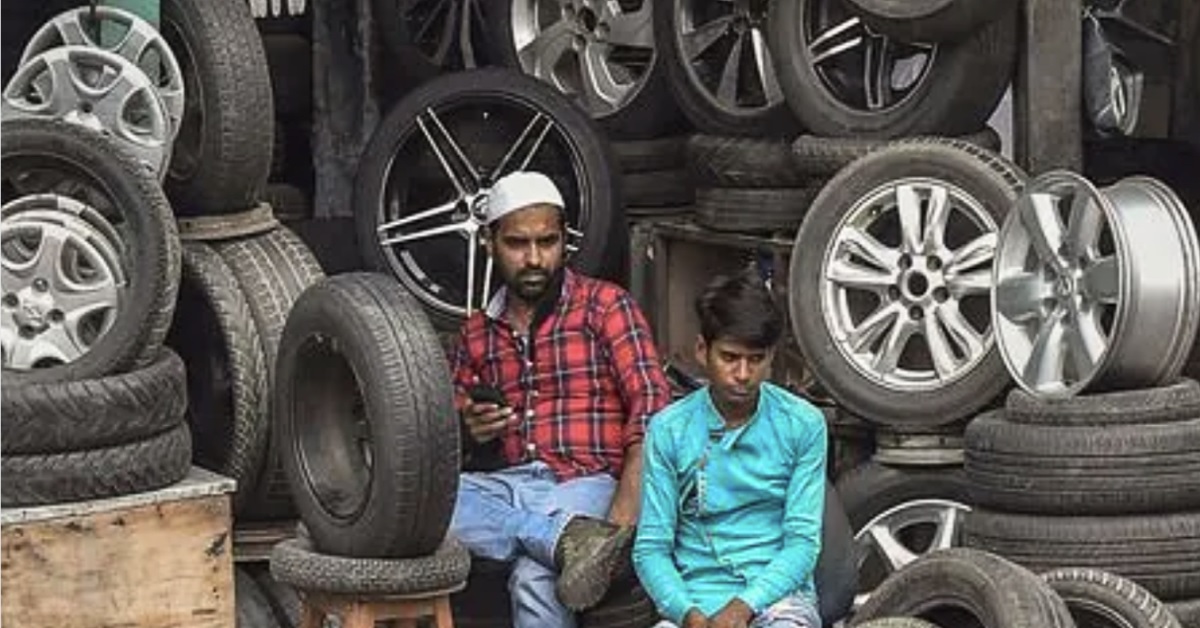Muslims have a palpable presence in the tyre business in the vast expanse of India and not just in the cycle-puncture making work as Prime Minister Narendra Modi tried to imply in his speech on April 14. They are engaged in the sale of car, jeep, two-wheeler, tractor and truck tyres and their retreading business too.
In the communal violence in Northeast Delhi in February 2020, a big tyre market was set ablaze by rioters thrice over three consecutive days, leading to the loss of crores of rupees. As many as 224 tyre shops, mostly dealing with old ones, were gutted. They all belonged to Muslims. Hundreds of families were badly affected by this mayhem.
Notwithstanding challenges, the community has made steady progress in different sectors in the last few decades. Not only boys, even girls have entered the fields hitherto considered a male bastion. So, it would be factually incorrect to pronounce that their children are just cycle puncture mechanics.
Occupational shift
In the fast-changing occupational shift it would be wrong to claim that any community, or for that matter even caste, monopolises any particular profession. Today, in this era of rampant unemployment, several upper caste Hindus with degrees from universities are also lining up for jobs related to scavenging, otherwise traditionally fixed for Valmikis, Mehtars or Doms. The “twice-born” would eagerly accept these menial sanitation jobs in municipalities or municipal corporations and would then outsource it to the same scheduled castes. The salary would be shared between the two – the real worker would take half and absentee one the rest. At least, something is better than nothing.
Thus, it would be inappropriate to synonymise cycle tyre-puncture makers with Muslims. Of late, many Hindus are too taking up this work. Technology is also playing its role as new variants of tubeless tyres for vehicles seldom get punctured.
If one accepts that 78 years after the “fictitious” independence of the country on August 15, 1947, many Muslim youths are still engaged in the cycle tyre-puncture work, one may ask as to why 11 years down the “real” independence (May 26, 2014), millions of Musahars (Dalit community) as the very name suggests, are still filling their stomach by catching and eating rats.
What about crores of other Dalits who are still compelled by circumstances to consume the meat of the dead cattle and pigs as food? Who has left them in such dire straits more than a decade after India got its Vishwaguru?
By that logic, should one blame the Hindu religious and charitable endowment boards for their sorry plight? Who should be held responsible for thousands of farmers’ suicide and starvation deaths if not the government?
Social status
Needless to claim, puncture-makers have a relatively better social and economic status than many others in the strongly-entrenched caste hierarchy of India. Several of them have risen to the top position in different arenas. The lowly-paid puncture workers have been making enormous contributions to the transportation industry, which is essential for the economic growth of India.
A cursory analysis of the job market would reveal as to how B. Tech, M. Tech and PhD degree holders are applying for the posts of railway gangmen, chowkidars, miners, peons etc. And they belong to all the communities and castes. Why talk just about waqf boards – hardly any temple, ‘matha’, church, gurdwara or vihara (monastery) is providing jobs to people.
Corruption and illegal encroachment of graveyards, maqbara and masjid land are not only confined to Muslims. Religious bodies of other faiths are too plagued by them.
Yet, some of these religious institutions belonging to all the communities are providing actually education. They are engaged in the health sector, small-scale economic activities, as well as other philanthropic works, but providing employment and creating congenial atmosphere for the growth of trade, commerce and industry lie essentially on the shoulders of the government of the time.
‘Pakoda’ outlets
If a person earns just Rs 200 daily – as asserted by Mr Modi in an interview some years back – by selling pakodas (fritters) outside any television studios in the national capital region (or any other metropolitan city), where the standard of living is very high, it cannot be called employment in an era where double this amount has been fixed as the minimum wage of an unskilled labour. Earning Rs 200 daily, or even Rs 2,000 daily, is not enough as an income for these mega-cities.
Some of us at the top live in our own bubble. We do not take into account money policemen and policewomen, unauthorised agents and local mafia who are enjoying the patronage of ruling party goons, extract from vendors – be it puncture workers, ‘pakoda’ sellers, or those involved in other roadside engagements. One day, another gentleman may wake up to declare that all these illegal activities are actually honorable rozgars.
The need of the hour is not to ridicule or see in poor light those engaged in self-employment as they are at least not puncturing the wheels of development and are not becoming a burden on the society and the government. They are neither committing crimes nor are they taking to streets demanding jobs from the government.
Thus, after ‘pakoda’ selling kiosks, we have in Waqf boards discovered a big source for providing employment. Is it not a fact that until a few years ago, Modi was pooh-poohing the Mahatma Gandhi National Rural Employment Act (MGNREGA)?
With unemployment still out of control, the Modi government now sees some merit in it.
Soroor Ahmed is a Patna-based freelance journalist.
First Published on TheWire

